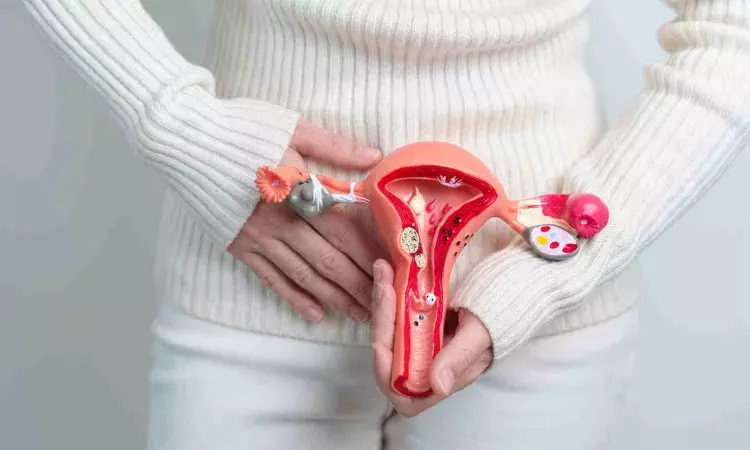- Home
- Medical news & Guidelines
- Anesthesiology
- Cardiology and CTVS
- Critical Care
- Dentistry
- Dermatology
- Diabetes and Endocrinology
- ENT
- Gastroenterology
- Medicine
- Nephrology
- Neurology
- Obstretics-Gynaecology
- Oncology
- Ophthalmology
- Orthopaedics
- Pediatrics-Neonatology
- Psychiatry
- Pulmonology
- Radiology
- Surgery
- Urology
- Laboratory Medicine
- Diet
- Nursing
- Paramedical
- Physiotherapy
- Health news
- Fact Check
- Bone Health Fact Check
- Brain Health Fact Check
- Cancer Related Fact Check
- Child Care Fact Check
- Dental and oral health fact check
- Diabetes and metabolic health fact check
- Diet and Nutrition Fact Check
- Eye and ENT Care Fact Check
- Fitness fact check
- Gut health fact check
- Heart health fact check
- Kidney health fact check
- Medical education fact check
- Men's health fact check
- Respiratory fact check
- Skin and hair care fact check
- Vaccine and Immunization fact check
- Women's health fact check
- AYUSH
- State News
- Andaman and Nicobar Islands
- Andhra Pradesh
- Arunachal Pradesh
- Assam
- Bihar
- Chandigarh
- Chattisgarh
- Dadra and Nagar Haveli
- Daman and Diu
- Delhi
- Goa
- Gujarat
- Haryana
- Himachal Pradesh
- Jammu & Kashmir
- Jharkhand
- Karnataka
- Kerala
- Ladakh
- Lakshadweep
- Madhya Pradesh
- Maharashtra
- Manipur
- Meghalaya
- Mizoram
- Nagaland
- Odisha
- Puducherry
- Punjab
- Rajasthan
- Sikkim
- Tamil Nadu
- Telangana
- Tripura
- Uttar Pradesh
- Uttrakhand
- West Bengal
- Medical Education
- Industry
Psychological factors linking pelvic pain and health-related quality of life in endometriosis: influence of illness representations and coping strategies

Endometriosis is a prevalent chronic gynecological condition characterized by severe pelvic pain, negatively affecting women's health-related quality of life. The Common-Sense Model of Illness Self-regulation has revealed the importance of illness perceptions and coping strategies in explaining the impact of illness on across several conditions. These aspects have never been assessed in endometriosis.
Authors aimed to explore the relationship between pelvic pain severity and health-related quality of life in women with endometriosis, hypothesizing that illness representations and pain-specific cognitive and behavioral maladaptive coping strategies influence this relationship.
This cross-sectional study analyzed data from 273 women with endometriosis who completed an online questionnaire assessing pelvic pain severity, illness perceptions, specific pain-related coping strategies, and health-related quality of life. A path analysis through MPlus was conducted to examine the direct and indirect relationships between variables.
The main findings of this cross-sectional study are that illness representations and coping strategies partially mediated the relationship between pelvic pain severity and HRQOL and that maladaptive coping strategies partially mediated the association between illness perceptions and HRQOL.
This study is the first to investigate the role of illness representations and cognitive coping strategies in the relationship between pelvic pain severity and HRQOL in patients with endometriosis. It indicates that the relationship between the intensity of illness symptoms (ie, pelvic pain) and HRQOL is partially mediated by negative illness perceptions, linking to maladaptive coping strategies (ie, increased pain catastrophizing, guarding, seeking social assistance, and resting), which, in turn, are associated with a diminished quality of life. The findings suggest the applicability of the CSM for conceptualizing the beliefs, perceptions, and cognitive strategies influencing the relationship between pain severity and HRQOL also in endometriosis patients. Clinicians should consider assessing illness representations to identify patients at risk of decreased QOL and employ cognitive therapies to challenge unhelpful negative illness perceptions and reduce maladaptive coping strategies, which can worsen the experience of pain caused by endometriosis.
Accordingly, future research should explore experimental interventions aimed at modifying illness representations or coping strategies and evaluate their impact on health outcomes in women with endometriosis.
Source: Spinoni M, Capano AU, Porpora MG, et al. Understanding the psychological factors linking pelvic pain and health-related quality of life in endometriosis: the influence of illness representations and coping strategies. Am J Obstet Gynecol 2025;233:54.e1-10.
MBBS, MD Obstetrics and Gynecology
Dr Nirali Kapoor has completed her MBBS from GMC Jamnagar and MD Obstetrics and Gynecology from AIIMS Rishikesh. She underwent training in trauma/emergency medicine non academic residency in AIIMS Delhi for an year after her MBBS. Post her MD, she has joined in a Multispeciality hospital in Amritsar. She is actively involved in cases concerning fetal medicine, infertility and minimal invasive procedures as well as research activities involved around the fields of interest.


